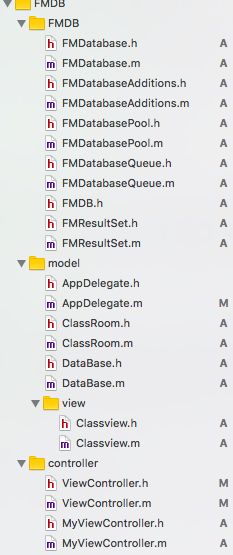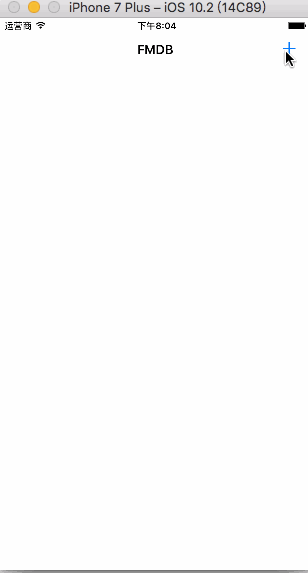一、FMDB的简单说明
1.什么是FMDB
FMDB是iOS平台的SQLite数据库框架
FMDB以OC的方式封装了SQLite的C语言API
2.FMDB的优点
使用起来更加面向对象,省去了很多麻烦、冗余的C语言代码
对比苹果自带的Core Data框架,更加轻量级和灵活
提供了多线程安全的数据库操作方法,有效地防止数据混乱
3.FMDB的源代码地址
https://github.com/ccgus/fmdb
二、核心类
FMDB有三个主要的类
1.FMDatabase
一个FMDatabase对象就代表一个单独的SQLite数据库
用来执行SQL语句
2.FMResultSet
使用FMDatabase执行查询后的结果集
3.FMDatabaseQueue
用于在多线程中执行多个查询或更新,它是线程安全的
接下来我们就上Demo
首先我们把sqlite3依赖库导入:
然后我们把把下载好的FMDB放进我们的项目中,把需要的MVC格式创建出来:
接下来是运行的效果:
同样跟SQL一样,我们需要创建的类文件都一样ClassRoom里面写属性用来存储数据,还是写姓名和年龄,继承于NSObject:
#import
@interface ClassRoom : NSObject
@property(nonatomic,assign)NSInteger integer;
@property(nonatomic,strong)NSString *name,*age;
@end
DataBase.h里写我们的单例方法和增删改查:
#import
#import "ClassRoom.h"
@interface DataBase : NSObject
// 单例
+(instancetype)initDataBase;
// 初始化数据库
-(void)initData;
// 创建数据库表格
-(void)createTable;
// 添加数据
-(void)addData:(ClassRoom *)thaData;
// 删除数据
-(void)deleteData:(NSInteger)theid;
// 修改数据
-(void)changeData:(ClassRoom *)theData;
// 查询数据
-(NSMutableArray *)Dataarray;
@end
接下来我们只需要记住SQL语句,其他的只要我们理解之后都可以根据自己的需求写出来:
#import "DataBase.h"
#import "FMDatabase.h"
static DataBase *thedata = nil;
static FMDatabase *db = nil;
@implementation DataBase
// 单例
+(instancetype)initDataBase
{
static dispatch_once_t onceToken;
dispatch_once(&onceToken, ^{
thedata = [[DataBase alloc]init];
});
return thedata;
}
+(instancetype)allocWithZone:(struct _NSZone *)zone
{
if (!thedata)
{
thedata = [super allocWithZone:zone];
}
return thedata;
}
-(id)copy
{
return self;
}
-(id)mutableCopy
{
return self;
}
// 初始化数据库
-(void)initData
{
// 创建Document目录
NSString *path = [NSSearchPathForDirectoriesInDomains(NSDocumentDirectory, NSUserDomainMask, YES) objectAtIndex:0];
//拼接数据库的表名的路径
NSString *strname = [path stringByAppendingString:@"/loaction.db"];
db = [[FMDatabase alloc]initWithPath:strname];
if ([db open])
{
NSLog(@"数据库创建成功");
[self createTable];
}
else
{
NSLog(@"创建失败");
}
}
// 创建数据库表格
-(void)createTable
{
[db executeUpdate:@"create table classroom(integer integer primary key,name text,age text)"];
[db close];
}
// 添加数据
-(void)addData:(ClassRoom *)thaData
{
if ([db open])
{
[db executeUpdate:[NSString stringWithFormat:@"insert into classroom values(null,'%@','%@')",thaData.name,thaData.age]];
}
else
{
NSLog(@"添加失败");
}
[db close];
}
// 删除数据
-(void)deleteData:(NSInteger)theid
{
if ([db open])
{
[db executeUpdate:[NSString stringWithFormat:@"delete from classroom where inTeger = '%ld'",theid]];
}
else
{
NSLog(@"删除失败");
}
[db close];
}
// 修改数据
-(void)changeData:(ClassRoom *)theData
{
if ([db open])
{
[db executeUpdate:[NSString stringWithFormat:@"update classroom set name = '%@',age = '%@' where inTeger= '%ld'",theData.name,theData.age,theData.integer]];
}
else
{
NSLog(@"修改失败");
}
[db close];
}
// 查询数据
-(NSMutableArray *)Dataarray
{
NSMutableArray *arr = [NSMutableArray array];
[db open];
FMResultSet *set = [[FMResultSet alloc]init];
set = [db executeQuery:@"select *from classroom"];
while ([set next])
{
ClassRoom *room = [[ClassRoom alloc]init];
room.integer = [set intForColumn:@"integer"];
room.name = [set stringForColumn:@"name"];
room.age = [set stringForColumn:@"age"];
[arr addObject:room];
}
[db close];
return arr;
}
@end
ClassView.h里面我们就在视图上添加两个文本框用来添加数据:
#import "Classview.h"
@implementation Classview
- (instancetype)initWithFrame:(CGRect)frame
{
if (self = [super initWithFrame:frame])
{
[self addSubview:self.nameTF];
[self addSubview:self.ageTF];
}
return self;
}
- (UITextField *)nameTF
{
if (!_nameTF)
{
_nameTF = [[UITextField alloc]initWithFrame:CGRectMake(30, 100, 200, 44)];
_nameTF.placeholder = @"请输入用户名";
_nameTF.borderStyle = UITextBorderStyleRoundedRect;
}
return _nameTF;
}
-(UITextField *)ageTF
{
if (!_ageTF)
{
_ageTF = [[UITextField alloc]initWithFrame:CGRectMake(30, 160, 200, 44)];
_ageTF.placeholder = @"请输入年龄";
_ageTF.borderStyle = UITextBorderStyleRoundedRect;
_ageTF.keyboardType = UIKeyboardTypePhonePad;
}
return _ageTF;
}
@end
view controller中我们继承于UITableViewController简单方便:
#import "ViewController.h"
#import "ClassRoom.h"
#import "Classview.h"
#import "DataBase.h"
#import "MyViewController.h"
#import "FMDatabase.h"
@interface ViewController ()
{
NSMutableArray *array;
}
@end
@implementation ViewController
- (void)viewDidLoad {
[super viewDidLoad];
self.navigationItem.rightBarButtonItem = [[UIBarButtonItem alloc]initWithBarButtonSystemItem:UIBarButtonSystemItemAdd target:self action:@selector(click)];
array = [NSMutableArray new];
}
-(CGFloat)tableView:(UITableView *)tableView heightForRowAtIndexPath:(NSIndexPath *)indexPath
{
return 80;
}
-(NSInteger)tableView:(UITableView *)tableView numberOfRowsInSection:(NSInteger)section
{
return array.count;
}
-(UITableViewCell *)tableView:(UITableView *)tableView cellForRowAtIndexPath:(NSIndexPath *)indexPath
{
UITableViewCell *cell = [tableView dequeueReusableCellWithIdentifier:@""];
if (!cell)
{
cell = [[UITableViewCell alloc]initWithStyle:UITableViewCellStyleDefault reuseIdentifier:@""];
}
ClassRoom *room =array[indexPath.row];
cell.textLabel.text = [NSString stringWithFormat:@"%ld\n%@\n%@",room.integer,room.name,room.age];
cell.textLabel.numberOfLines = 0;
return cell;
}
-(void)tableView:(UITableView *)tableView didSelectRowAtIndexPath:(NSIndexPath *)indexPath
{
MyViewController *my = [[MyViewController alloc]init];
my.theroon = array[indexPath.row];
[self.navigationController pushViewController:my animated:YES];
}
-(void)tableView:(UITableView *)tableView commitEditingStyle:(UITableViewCellEditingStyle)editingStyle forRowAtIndexPath:(NSIndexPath *)indexPath
{
[[DataBase initDataBase]initData];
[[DataBase initDataBase]deleteData:[array[indexPath.row]integer]];
[array removeObject:array[indexPath.row]];
[self.tableView reloadData];
}
-(void)viewWillAppear:(BOOL)animated
{
[[DataBase initDataBase]initData];
array = [[DataBase initDataBase]Dataarray];
[self.tableView reloadData];
}
-(void)click
{
MyViewController *my = [[MyViewController alloc]init];
[self.navigationController pushViewController:my animated:YES];
}
@end
MyViewController.h里面我们用一个属性传值把两个控制器关联一下:
#import
#import "ClassRoom.h"
@interface MyViewController : UIViewController
@property(nonatomic,strong)ClassRoom *theroon;
@end
MyViewController.m里面我们就把需要传递的数据写上:
#import "MyViewController.h"
#import "ClassRoom.h"
#import "DataBase.h"
#import "Classview.h"
@interface MyViewController ()
{
Classview *classview;
}
@end
@implementation MyViewController
- (void)viewDidLoad {
[super viewDidLoad];
classview = [[Classview alloc]initWithFrame:self.view.frame];
classview.backgroundColor = [UIColor whiteColor];
self.view = classview;
classview.nameTF.text = self.theroon.name;
classview.ageTF.text = self.theroon.age;
if (classview.nameTF.text.length<=0)
{
self.navigationItem.rightBarButtonItem = [[UIBarButtonItem alloc]initWithBarButtonSystemItem:UIBarButtonSystemItemSave target:self action:@selector(save)];
}else
{
self.navigationItem.rightBarButtonItem = [[UIBarButtonItem alloc]initWithBarButtonSystemItem:UIBarButtonSystemItemEdit target:self action:@selector(edit)];
}
}
-(void)save
{
ClassRoom *roomq = [[ClassRoom alloc]init];
roomq.name = classview.nameTF.text;
roomq.age = classview.ageTF.text;
[[DataBase initDataBase]initData];
[[DataBase initDataBase]addData:roomq];
[self.navigationController popViewControllerAnimated:YES];
}
-(void)edit
{
self.theroon.name = classview.nameTF.text;
self.theroon.age = classview.ageTF.text;
[[DataBase initDataBase]initData];
[[DataBase initDataBase]changeData:self.theroon];
[self.navigationController popViewControllerAnimated:YES];
}
@end
最后总结一下,其实SQL和FMDB这两个都是差不多的,只不过需要重点注意的地方就是增删改查里增删改的方法都是executeUpdate,这三个方法是一样的,查询数据这块是executeQuery我们需要记住这两个方法.还有就是我们这个SQL语句添加我们的属性地方我们都需要加一个单引号,这个是重点需要注意的.写的有点匆忙,大家见谅..


